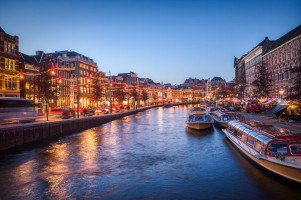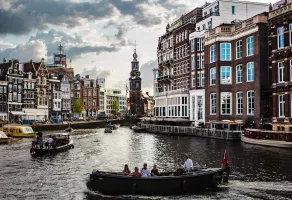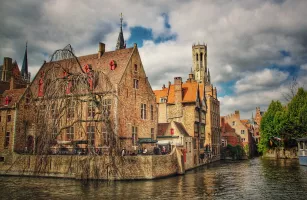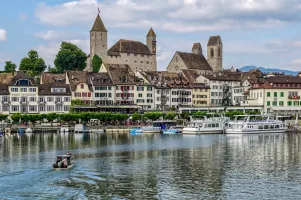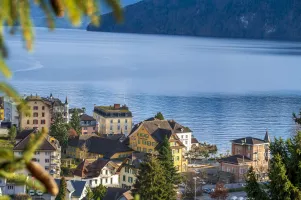The Appian Way Travel Guide
The Appian Way, also known as Via Appia, is one of the oldest and most important Roman roads in Italy. Built in 312 BC, it connected Rome to the southern regions of the country, playing a significant role in the expansion of the Roman Empire. The Appian Way is famous for its historical significance, as it was lined with ancient monuments, tombs, and catacombs, offering a glimpse into the rich history of Italy.Top Attractions in The Appian Way
- Visit the Catacombs of San Callisto
- Explore the Appian Way Regional Park
- Admire the Tomb of Cecilia Metella
- Walk along the ancient Roman road
The Appian Way is Famous for
Its well-preserved ancient ruins and historical significance.Top Attractions in The Appian Way
- Explore the Catacombs of San Sebastiano
- Visit the Church of Domine Quo Vadis
- Admire the Mausoleum of Romulus
- Walk or bike along the ancient Appian Way
What's Great about Travelling to The Appian Way?
- History enthusiasts will be captivated by the ancient ruins - Nature lovers can enjoy the scenic beauty of the Appian Way Regional Park - Perfect destination for a relaxing and educational vacationWhat's Not So Great about Travelling to The Appian Way?
- Not ideal for those looking for a bustling city experience - Limited dining and accommodation options along the ancient road - May not be suitable for travelers with mobility issues due to uneven terrainTravel Tips for The Appian Way
- Wear comfortable shoes for exploring the ancient ruins
- Check for guided tours to enhance your experience
- Bring plenty of water and snacks as facilities are limited along the road
Important The Appian Way trip information
- Ideal Duration: 1-2 days to explore the major attractions
- Best Time to Visit: Spring and Fall for pleasant weather
- Nearby Airports and Railway Stations: Rome Ciampino Airport and Roma Termini Railway Station
Per Person
1,77,500
*EXCLUDING APPLICABLE TAXES 5.0 Ratings
( 20 Reviews )
( 20 Reviews )
Per Person
70,000
*EXCLUDING APPLICABLE TAXES 5.0 Ratings
( 4 Reviews )
( 4 Reviews )
Total
4,95,000
*EXCLUDING APPLICABLE TAXES 5.0 Ratings
( 20 Reviews )
( 20 Reviews )
Total
4,63,000
*EXCLUDING APPLICABLE TAXES 5.0 Ratings
( 20 Reviews )
( 20 Reviews )
Total
4,27,500
*EXCLUDING APPLICABLE TAXES 5.0 Ratings
( 20 Reviews )
( 20 Reviews )
Per Person
2,37,500
*EXCLUDING APPLICABLE TAXES 5.0 Ratings
( 20 Reviews )
( 20 Reviews )
FAQ's on The Appian Way
Q1: What is the best time to visit The Appian Way?
The best time to visit The Appian Way is during the spring months of April and May or in the fall months of September and October when the weather is pleasant, and the landscape is vibrant. These seasons offer comfortable temperatures for exploring the historic road and its surroundings without the crowds of peak tourist season. Additionally, special events and festivals often take place during these months, adding to the cultural experience.
Q2: Do I need a visa to travel to The Appian Way?
Travelers from most countries do not need a visa to visit Italy, which includes The Appian Way. However, it is essential to check the specific visa requirements based on your nationality and the duration of your stay. Make sure your passport is valid for at least six months beyond your planned departure date. For longer stays or other purposes such as work or study, a visa may be necessary. It is recommended to verify the latest visa regulations before traveling.
Q3: What are the must-visit attractions in The Appian Way?
The must-visit attractions in The Appian Way include the ancient Roman road itself, lined with ancient tombs, ruins, and archaeological sites. Visit the Catacombs of San Callisto or San Sebastiano for a glimpse into early Christian history. Explore the Appian Way Regional Park, a green oasis with walking and biking paths. Don't miss the Capo di Bove Villa, Circus of Maxentius, and the Mausoleum of Cecilia Metella. The Church of Domine Quo Vadis and the Baths of Caracalla are also significant historical sites along this iconic road.
Q4: Is The Appian Way a safe place to travel?
The Appian Way and its surrounding areas are generally safe for travelers. However, like any tourist destination, it is essential to remain vigilant and aware of your surroundings, especially in crowded areas. Avoid isolated areas at night and be cautious of pickpockets in busy tourist spots. It is advisable to keep your belongings secure and follow standard safety precautions. In case of emergencies, know the local emergency numbers and have travel insurance for peace of mind.
Q5: What is the local currency in The Appian Way and can I use credit cards?
The local currency in Italy, including The Appian Way, is the Euro (€). ATMs are widely available in cities and towns for cash withdrawals. Credit cards are commonly accepted in most establishments, including hotels, restaurants, and shops. However, it is advisable to carry some cash for small purchases or in case you visit rural areas with limited card facilities. Notify your bank of your travel plans to avoid any issues with card payments abroad. Currency exchange services are also available at airports and banks for convenience.
Q6: What is the local cuisine like in The Appian Way?
The local cuisine in The Appian Way region, like the rest of Italy, is rich in flavors and traditional dishes. Enjoy classic Roman specialties such as Cacio e Pepe (cheese and pepper pasta), Carbonara, and Amatriciana. Try local wines like Frascati or Castelli Romani while savoring authentic Italian gelato for dessert. Street food options include supplì (rice balls) and pizza al taglio (pizza by the slice). Seafood lovers can indulge in fresh seafood dishes along the coast. Vegetarians will find plenty of pasta, risotto, and vegetable-based dishes in restaurants. Be sure to sample regional delicacies and explore the culinary diversity of The Appian Way during your visit.
Q7: What transportation options are available in The Appian Way?
Transportation options in The Appian Way region include buses, trams, and the metro for getting around cities like Rome. Taxis are readily available but can be expensive for longer journeys. Renting a car is a convenient option for exploring the countryside and reaching archaeological sites along The Appian Way. Cycling and walking are popular ways to explore the ancient road and its surroundings at a leisurely pace. Guided tours are also available for a comprehensive experience. Consider using public transportation for city travel and hiring a car or joining a tour for excursions to more remote areas. Plan your transportation based on your itinerary and desired flexibility during your trip.
Q8: Are there any cultural norms or etiquette I should be aware of when visiting The Appian Way?
When visiting The Appian Way and Italy in general, it is essential to respect local customs and etiquette. Greetings often involve a handshake or kiss on the cheek, especially when meeting someone for the first time. Dress modestly when visiting religious sites and adhere to dress codes if applicable. Italians appreciate punctuality, so arrive on time for appointments or reservations. Tipping is not mandatory but is appreciated for good service in restaurants or for tour guides. Avoid discussing sensitive topics like politics or religion unless initiated by locals. Learn a few basic Italian phrases to show respect for the local language. Embrace the relaxed pace of life, enjoy leisurely meals, and immerse yourself in the rich cultural heritage of The Appian Way with an open mind and heart.
Q9: I am a travel agent. How can I buy travel leads of The Appian Way?
Register yourself as a travel agent at agents.tripclap.com and then you can buy travel leads to The Appian Way once your account is approved. For more details contact our support team at +91-8069186564 or support@tripclap.com

